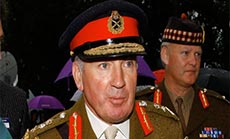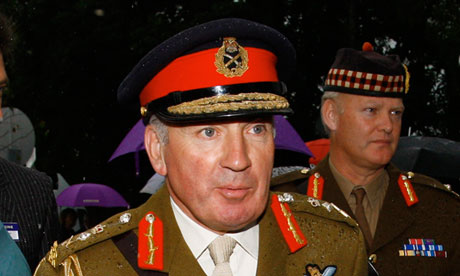
Former UK Military Chiefs Object Syria Attacks: Decision from Hell

Local Editor
Former leaders of the British armed forces led objections on Tuesday to military strikes against Syria.
 General Lord Dannatt, former head of the British army, and Lord West, former first sea lord, both warned of unintended consequences if, as seems increasingly likely, US forces launch missiles against President's Bashar al-Assad's military facilities in the coming days.
General Lord Dannatt, former head of the British army, and Lord West, former first sea lord, both warned of unintended consequences if, as seems increasingly likely, US forces launch missiles against President's Bashar al-Assad's military facilities in the coming days.
A former UK ambassador to Syria, Sir Andrew Green, urged Russia and China to use their influence rather than military force while Lord King, the former defense secretary, said it was imperative to find a solution, "and it mustn't be military".
"It's wrong," said Dannatt of the strike plan being drawn up in Washington, Paris and London. "Because although undoubtedly by any moral standards at all using chemical weapons against your own people - [is wrong] this does not constitute an open invitation for the international community to impose themselves on the internal affairs of another country."
He told the BBC that the international community was "fractured" on the issue and one of the many unknowns about Syria was "what the effect of these strikes would be on the developments and consequences of the civil conflict".
Lord West, a former minister, urged diplomacy before military action and was among those worried the west could find itself sucked into a vortex of violence in the region. He told the Daily Mail he was "very wary" of an attack.
"The region is a powder keg," he said. "We simply can't predict which way military action will go."
Speaking later to Channel 4 News, Dannatt said David Cameron needed to use Thursday's recall of Parliament to convince the British people that military action is the right step. "A clear case will only be made if a strategic context of how such an intervention can be made is laid out clearly. For the objectives, the beginning, the middle, and the end - how it's all going to finish."
The former British ambassador to Washington, Sir Christopher Meyer, said the prime minister faced a "decision from hell".
Speaking on BBC2's Newsnight, he said: "It cannot be in the British national interest to see al-Assad disintegrate under the pressure of cruise missile attacks, and whatever else may be done, such that his stocks of chemical weapons fall out of his control into the hands of the extremist Jihadists among the rebels.
"This is why this decision on what to do next is truly the decision from hell."
General Sir David Richards, who only stood down as chief of the defense staff earlier this summer, is understood to have previously cautioned against attacking Syria, while on Tuesday a former senior naval officer, Rear Admiral Chris Parry, said he believed London and Washington were repeating a mistake by turning to the military before properly establishing their objectives.
"More responsibility needs to be thrown at Russia and China," said Parry, who used to command the UK's amphibious task group. "Instead of sending cruise missiles into Syria we should be sending diplomatic cruise missiles into Russia and China. We need to make it clear that they have complicity in this."
He questioned the benefit to the west if attacks killed civilians and pointed out that it was not a simple question whose side the west is on. "We are not going to go on to the ground and separate these two fighting dogs," he said. "We are not sure who we are supposed to be supporting because they may be enemies of ours When the whole of the Middle East is in foment you do not need to throw another grenade in."
Source: The Guardian, Edited by website team



